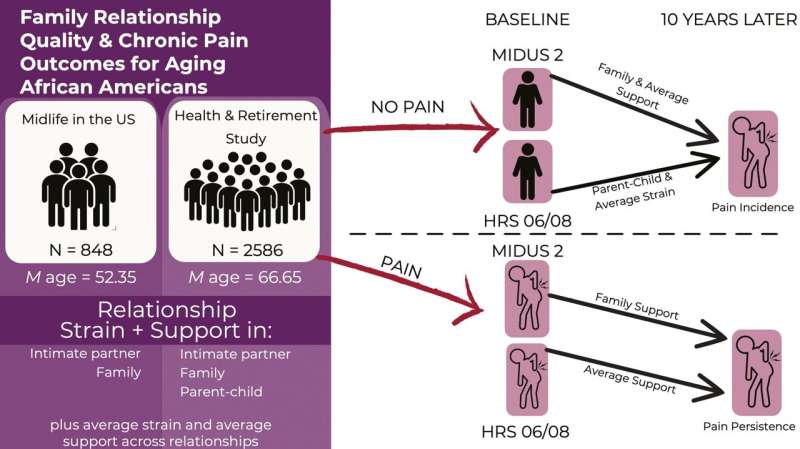This article has been reviewed according to Science X's editorial process and policies. Editors have highlighted the following attributes while ensuring the content's credibility:
fact-checked
trusted source
proofread
Study links chronic pain to quality of family relationships

Strong family relationships have long been associated with a better sense of well-being and connection. Now a team led by UT Southwestern Medical Center researchers has linked the quality of those relationships with how successfully people—particularly aging African Americans—manage pain. The findings, published in The Journals of Gerontology, Series B: Psychological Sciences and Social Sciences suggest factors tied to chronic pain that could improve treatment options.
"African Americans who are surrounded by positive relationships with family may be less likely to experience chronic pain as they age," said Sarah Woods, Ph.D., Associate Professor and Vice Chair of Research in Family and Community Medicine at UT Southwestern. "If pain develops, they may be especially likely to achieve chronic pain remission."
The team chose to focus on African Americans because, despite well-documented disparities, this segment of the population is underrepresented in pain research. Most of the understanding involving the efficacy of pain treatment is largely driven by research conducted on healthier, mostly white patients.
"Compared with older white adults, older African Americans suffer disproportionately worse pain progression, great pain-related limitations, and increased pain-related mortality," Dr. Woods noted. "Racial bias in pain management leads to inadequate pain treatment."
The study analyzed responses from more than 3,300 African American participants in two separate datasets—the Midlife in the United States (MIDUS) study and the Health and Retirement Study—about chronic pain in 2006 and again a decade later.
It found that aging African Americans who reported negative or strained relationships with their children—particularly children who were demanding, critical, or irritating—were more likely to develop chronic pain over a 10-year period. However, family support characterized by warmth, reliability, and dependability saw the opposite, with the protective effects from pain exceeding the benefits gained by vigorous physical activity, as measured in other research studies.
"Next we plan to test exactly how stress influences pain," Dr. Woods said. "We hypothesize that family relationships marked by more stress and strain show up as depressed mood, anxiety, and increased inflammation. That, in turn, perpetuates the development and persistence of chronic pain. Conversely, we hypothesize that more caring and supportive family relationships can be health-protective by promoting emotional and physiological regulation, especially in the face of stress."
Researchers found that family, specifically among aging African Americans, plays a key role in determining risk or resilience for chronic pain.
"Our work begins to identify where it may be particularly helpful to intervene in family relationships to ameliorate stress or to promote caring and pain management support," Dr. Woods explained.
"Older African American patients living with chronic pain say they need family support to effectively manage their pain. Engaging family in primary care for preventive benefits, or pain treatment for pain relief, may even serve to enhance the warmth and connection of existing positive relationships."
Another benefit, she added, is that such treatment could improve the patient's trust in engaging with the health care system.
More information: Sarah B Woods et al, Longitudinal Associations of Family Relationship Quality With Chronic Pain Incidence and Persistence Among Aging African Americans, The Journals of Gerontology, Series B: Psychological Sciences and Social Sciences (2024). DOI: 10.1093/geronb/gbae064




















